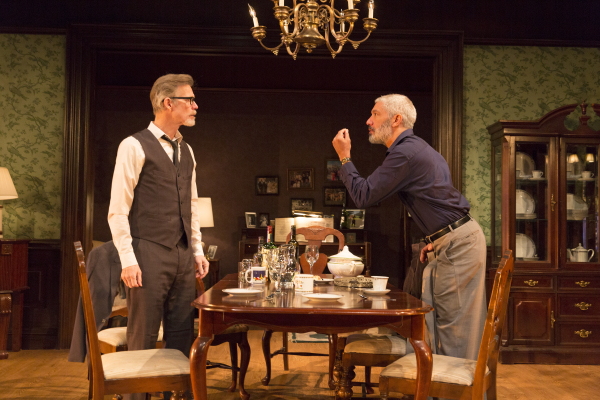The Winter's Tale

(© Richard Termine)
Would you forgive your husband if he accused you of adultery and threatened to kill you? And if you actually died, would that forgiveness even be possible? Those are a couple of the many troubling questions posed by The Winter's Tale, which some consider one of William Shakespeare's "problem plays" — made all the more problematic here by a confusing new production from the Pearl Theatre Company.
The entire show takes place on Brett J. Banakis' dining room set, an odd choice to double as the play's intended locations of Sicily and Bohemia. Wearing Tilly Grimes' business-casual costumes, the ensemble of actors enters the space, party in full-swing. They sip top-shelf liquor and listen to bossa nova (sound by John D. Ivy), surrounded by Rococo porcelain statues, untouchable fine china, and neatly framed photographs. Bradley King's mellow lighting gives the impression of an extended get-together between old friends. It's kind of like a Shakespearean version of The Big Chill.
And like that 1983 dramedy, the sexual politics runneth over: Sicilian King Leontes (Peter Francis James) is hosting his childhood friend Polixenes (Bradford Cover), King of Bohemia, for an extended stay at his court. Polixenes insists he must return home, but Leontes' pregnant wife Hermione (Jolly Abraham) is able to convince him to stay. This leads Leontes into a jealous rage as he begins to suspect that his old friend is really the father of Hermione's unborn child. Leontes orders Camillo (Tom Nelis) to poison Polixenes. Instead, Camillo alerts Polixenes of his old friend's madness and the two flee to Bohemia. Not so lucky, Hermione is locked in a dungeon (in this case, a coat closet) and accused of high treason by her husband, leading their son Mamillius (James Udom) to die of grief. Good nobleman Antigonus (Dominic Cuskern) spirits Hermione's newborn daughter away to Bohemia where the play transforms into a pastoral comedy, but not before Antigonus is violently eaten by a bear.
Yes, you read that correctly. This is the play in which Shakespeare penned the infamous stage direction "Exit, pursued by bear." An ultra-contrived deus ex machina designed to dispatch an inconvenient character? Absolutely. Still, it's a lot of fun to watch, especially as created by director Michael Sexton. Clad in heavy fur coats, the whole ensemble pitches in to create the bear, with one actor holding up a mounted bear's-head hunting trophy. Following the Scotch-swilling revelry of the first half, a clear perspective emerges: This production is all about the inventive theatricality children employ to tell fantastical stories (or winter's tales) while their parents are getting hammered with their boring friends.
Unfortunately, this clever conceit completely falls apart in the second half. We watch Hermione's grown-up daughter Perdita (Imani Jade Powers) attend a sheep-shearing festival with her adoptive family and fall in love with Bohemian Prince Florizel (Udom). All the furniture and finery from the first part is cleared out, but the William Morris-style wallpaper and elegant wood moldings remain. A rolled-up rug rests against the upstage wall, as if the house has been ransacked. All of this makes for a pretty inexplicable set, and not in a way that feels messy and exciting.
That's not to say that there aren't many fine performances. As Paulina, the brave noblewoman who stands up for Hermione, Rachel Botchan unflinchingly delivers some of the play's clearest and most compelling verse. Adam Green endows his clown with a goofy Indiana dialect that feels oddly appropriate for a Bohemian country bumpkin. As the vagabond Autolycus, Steve Cuiffo keeps us constantly entertained with his sleight of hand and comedic guitar antics.
Peter Francis James registers the most memorable performance as the insanely jealous Leontes. We watch him formulate his thoughts along with the verse. Nothing seems pre-planned. The King's violent whims are spontaneous and terrifying, just as the Bard intended.
Still, it's not enough to clarify the long stretches of the play his character is not in. And by the end of this three-hour affair, you probably won't care to invest any more time trying to figure out what it all means. "A sad tale's best for winter," remarks Prince Mamillius. With three acts of tragedy and two acts of comedy, The Winter's Tale is neither sad nor happy, just perplexing.










